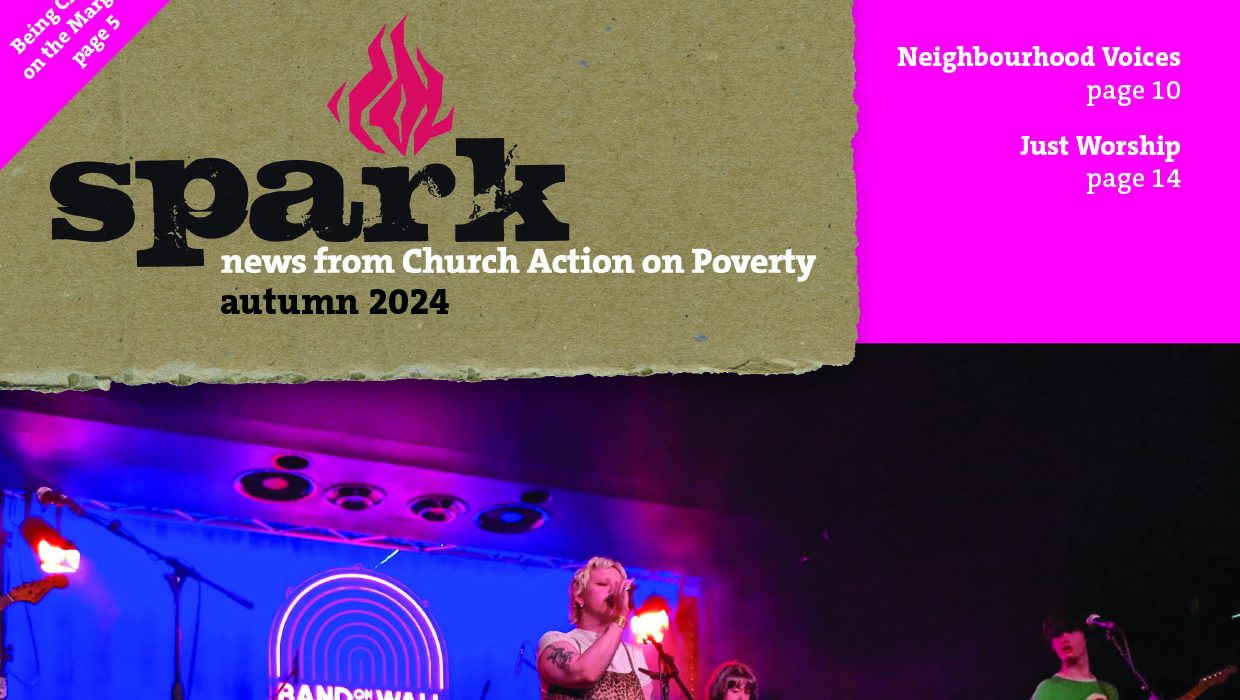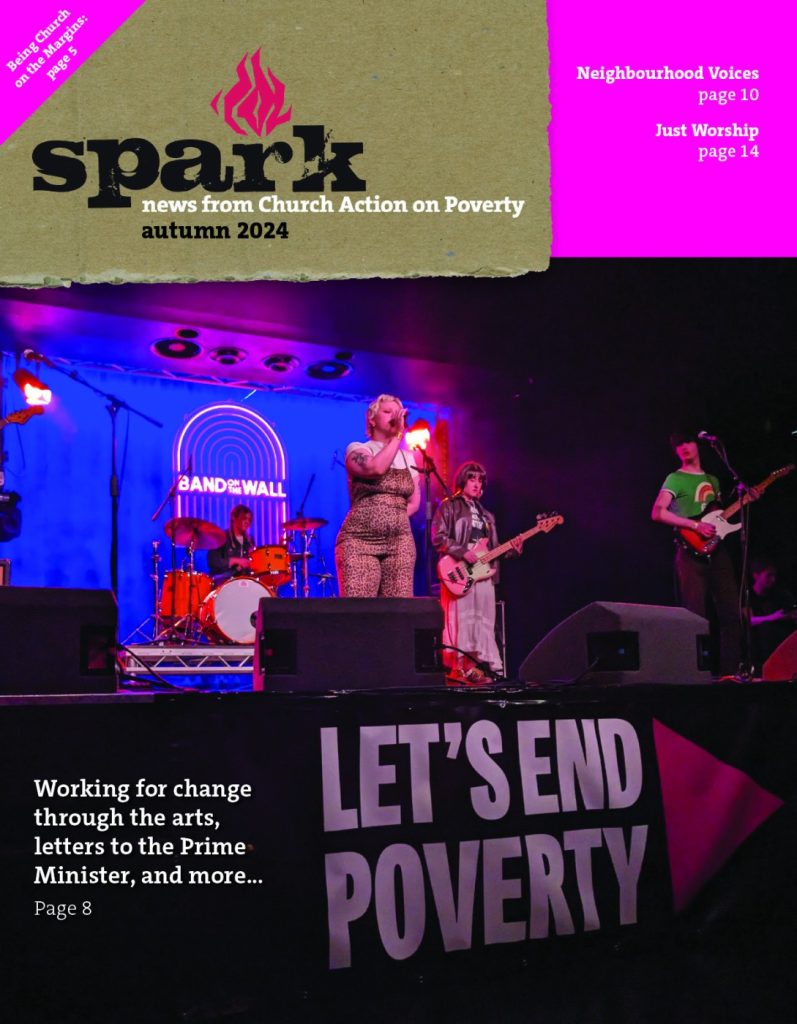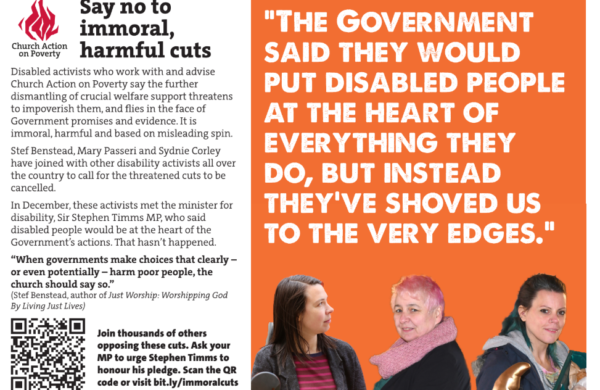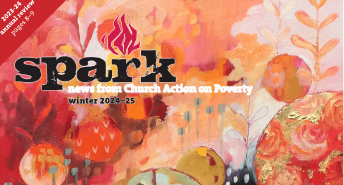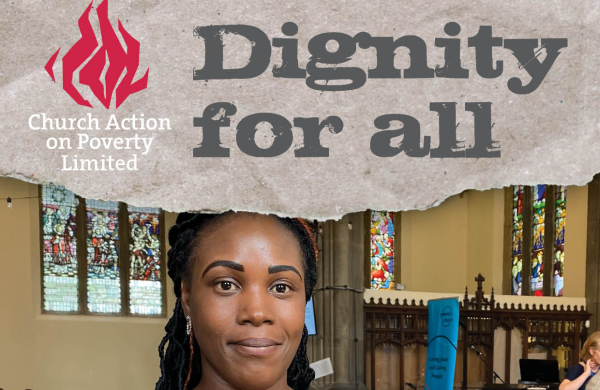Mr John Baker, Trustee, Earl Shilton Methodist
Pastor David Howe, Pastor, Heanor Baptist Church
Mr John M Hoyle, Steward, Nene Valley Methodist
Ms Caroline Wallace
Mr Michael Brueck, Member, Providence New Mills
Mrs H Sills, Member Of The Justice Action Group, Southwell Minster
Dr Joseph Forde, Church Librarian, St Mark’s Church, Broomhill, Sheffield
Reverend Martyn William Jarrett, Retired Bishop, Worksop Priory
Rev Mark Welch, Coordinating Minister, Burton Latimer Baptist Church
Mrs Kerry Haslam, Food Bank And Christmas Gift Appeal Leader, The Salvation Army
Mrs Deborah Panks, Member And Band Member, Harrowby Lane Methodist Church
Mrs Anne Peacey, Chair, National Justice And Peace Network, Our Lady And St Thomas, Meadowhead, Sheffield
Mr Robert Wakeling, Member, Trinity Church Buxton
Dr Graham Bowpitt, Pcc Member, St Nic’s Nottingham
Mrs June Murray, Senior Steward, Great Glen Methodist Church
Chris Bourne, Member, Christ Church, Chilwell
Mrs Hilary Finlay, Lay Person, Goat Shed Retreat
Mrs Sheila Knopp, Elder, Trinity Urc St Albans – Elder
Revd James Ramsay, Pto, All Saints, Briston
Revd John Churcher, Retired Minister, St Albans & Welwyn Circuit
Mrs Beryl Vickery, Churchwarden, St Albans, Hemel Hempstead
Phyll Wood, Lay Minister (Reader), St Leonard, Lexden
Mrs Jean Goodrick
Mrs Susannah Read, Attendee, Holly Lodge
Christina Mccabe, Disciple, Various
Mrs Camille Fidgett, Parishioner, Hemel West Catholic Parish
Revd Ian Gardner, Minister, Brantham
Revd Dr Robert Ely, Retired Minister, Ely Methodist Church
Mrs Ros Hancock, Circuit Pastoral Worker, S Beds Methodist Circuit
Mr Keith Aldred, Member, St Peter’s St Albans
Mr Andmrs Stanley And Dorothy Dean, Retired Elders And Dot Is A Lay Preacher, Maldon Urc
Revd Colin Carr, Lowly, Blackfriars, Cambridge
Revd Dr Ros Hunt, Priest, St Giles
Miss Patricia Barber, Reader, Sacred Heart, Luton
Revd Jonny Bell, Minister, Holot
Julie Minns, Retired Minister, Trinity Methodist
Mrs Deirdre Munro, Pastoral Lay Minister, Christ Church East Sheen
Mr Michael Mcloughlin, Member Ex Parish Council Chair, St Elphege
Mr John Warren, Catechist, St Joseph Bromley
Mr John Murphy, Attending Member, Good Shepherd Downham
Mr Richard Solly, Member, St Thomas More
Mrs Rosa Shea, Regular Attender, Saint Aidan’s Justice And Peace Group
Mrs Carol Woollard, Sacristan, North Lambeth Parish
Mrs Pat James, Retired, St Andrews Thornton Heath
Ms Magdalen Lawler, Religious Sister, Most Holy Trinity, Dockhead
Dr Gemma Wieberg, Parishioner, Christchurch With St Philip’s
Ms Claire Crowley, Ecumenical Officer, Churches Together In South London
Mr Nick Eades, Leadership Team, East Plumstead Baptist
Sister Gabriel Robin, Member Of A Religious Order: Canonesses Of St Augustine, Roman Catholic
Revd S Early, Vicar, Addiscombe Baptist
Mr Tom Harris, Congregation Member, Inspire Saint James Clerkenwell
Ms Samira Mackenzie, N/A, N/A
Revd Peter Cornick, Superintendent Minister, Hinde Street Methodist
Rev’d Timothy Meadows, Moderator Of General Assembly, The United Reformed Church
Mrs Barbara Hungin, Chair Justice And Peace Commission, St Mary’s Cathedral Middlesbrough
Mrs Elizabeth Archibald, Parishioner, St George’s
Mrs Mary Davidson, Elder, St Mark’s United Reformed Church
Mrs Margaret Mcallister, Children And Youth Volunteer, Mrs
Mrs Anne Farrow, None, Centenary Methodist Church Crawcrook
Mr Roger Gordon, Safeguarding Officer, North Shields Methodist Church
Prof Helen Goodman, Member Of Pcc, Cap
Revv Paul Worsnop, Minister, Windy Nook Methodist Church
Mrs June Davis, Member Of Pcc, St Pauls Church
Mrs Bernadette Askins, Trustee And Deputy Chair, Churches Together South Tyneside
Major David Burns, Divisional Commander – North East Division, The Salvation Army
Rt Revd Stephen Wright, Bishop, Diocese Of Hexham And Newcastle
Dr Elspeth Brighton
Mr Edward Egan, Retired Teacher, Brother
Harriet Grimsditch, None, None
Ms Enid Pinch, Clerk Of South Mancheser Local Meeting, Religious Society Of Friends (Quakers)
Ms Melanie Hall, Elder And Worship Leader, Wilbraham St Ninian’s Urc
Sister Philomena Grimley, Pastoral Minister, Parish Of Christ The King And St Kentigern Blackpool
Ms Hilary Thomas, Co-Leader Of J-Club (Sunday Morning Group For Children And Young People); Parochial Church Council Member; Deanery Synod Member, St Thomas’, Pendleton, Salford
Reverend Kate Gray, Minister, The Dandelion Community
Mr Patrick Rooney, Faith And Justice, St Wilfrids Preston
Reverend Colin Harbach, Supernumerary Minister, North Cumbria Methodist Circuit
Mr Liam Purcell, Communications And Supporter Relations Manager, Church Action On Poverty
Revd Mark Nash-Williams, Vicar, Parish Of Alston Moor
Mrs Daphne Hampson, Member, Christ Church Heaton
Mrs Alison Love, Trustee, Lancaster Methodist
Mr Jonathan Murray, Pcc Member, St James Gorton, Manchester
Mr Brian Robbins, Local Preacher, Thornton Methodist
Doctor Margaret Devadason, Parishioner, Brown Knowle Methodist Church
Revd Dr Lesley Husselbee, Member (Retired Urc Minister), Chorlton Central Church, Manchester
Mrs Catriona Roussel, Retired, Chorlton Central Church Barlow Moor Rd Chorlton M21 9fb
Mrs Hazel Scott Bowes, Worship Leader, Langwathby Methodist Church
Mrs Susan Lewis, Junior Church Leader, St Michael With St Thomas Widnes
Revd Anna Jarvis, Minister, Monton Unitarian Church
Mr Nigel James, Licensed Lay Minister, St John The Evangelist, Great Sutton
Ms W Elizabeth Coleman, Member, Eccles Quakers
Dr Raj Patta, Presbyter, United Stockport Circuit
Revd Andrew Edwards, Diocesan Ecumenical Adviser, Christ Church Norris Green
Mr George Carter, Reader, St Paul’s Hatton Hill
Reverend Jeff Radcliffe, Retired, Holy Trinity
Ms Rhoda Martin, Organist, Pcc Member, Parish Church Of St Mary, Penwortham
Mrs Anna Newton, Pcc Sec, At Michael’s Chester
Miss Grace Buckley, Member Of Parish Council, Archdiocesan Justice & Peace Group
Revd Alan Watt, Retired Minister, Church Of Scotland
Mrs Kate Houston, None, St Mayr’s Cathedral
Sister Rosemary Reilly, Parishoner, Catholiç
Ms Kate Mchendry, None, None
Mrs Oriole Hall, N/A, Inverness Quakers
Reverend Bruce Cameron, Retired Bishop, Scottish Episcopal Church
Reverend Edward Andrews, Interim Moderator, Easter Ross Peninsula Church
Sr Gina Cardosi, Parishionee, Daughters Of Wisdom
Stuart Holden, Parishioner, Catholic
Mrs Margaret Sparkes, Churh Elder, Buchlyvie And Gartmore Church Of Scotland
Mr Hugh Mathie, Group Leader, Stirling Baptist
Mrs Jennifer Agricola, Sidesperson, Ctic/Holy Trinity
Mr Philip Hayllar, Parishioner, Sacred Heart & St Peter The Apostle Waterlooville
Mr Terence Brown, Member, St Mary’s Crowborough
Mrs Meg Rew, Volunteer Responsible For Parish Website, Worth Abbey Parish
Mr Graham Ryan, Member, Our Lady Of Lourdes Rc Church, Harpenden
Mrs Norma Manton, Member, Gosport Methodist Church
Revd Wendy White, Work As Mse, Trinity
Mr John Shaw, Trustee, Wendover Free Church
Mrs Kate Goodacre, Member, St Matthews Church, Ixford
Mrs Lorna Hicks, N/A, Holy Trinity, Headington Quarry
Mrs Susan Jappie, Society Of Friends/ Quakers At Lewes Meeting House
Mrs Mary Williams, Member, St Albans
Revd Terry Hemming, Retired, Andover Parish
Revd Stephen J Peck, Deacon, Methodist
Revd Harvey Richardson, Supernumerary Minister, Canterbury & E Kent Circuit
Mrs Helen Fletcher, Member, Haywards Heath Methodist Church
Mrs Linda Marshall, Member And Representative On The Local Churches Together, Staines Methodist
Dr Timothy Bartel, Member, Cowley St John Parish, Oxford
Mrs Marilyn Mahon, Church Secretary, Trinity Church
Mrs Bridget Flowers, Volunteer, Christchurch
Mrs Emilia Simmons, Justice And Peace Representative, Immaculate Conception Of Our Lady RC Parish Peacehaven
Mrs Jane Perry, Lay Pioneer, St Anne’s Lewes
Mr Don Littlejohn, Worship Leader, Mosaic Church
Mr Victor Rones, None, Methodist
Revd Geoff Pearson, Member Of Prayer Ministry Team, Canterbury Vineyard
Mrs Alison Maxwell, Member, Blue Idol Quaker Meeting
Revd Kate Cambridge, Minister, St Andrews And Bishopstoke Methodist Churches
Mrs Vicky Scott, Hospitality Lead, Pcc Secretary, St Pauls
Dr David Chapman, Chair Of The Social Justice Group, Christ The Cornerstone, Milton Keynes
Margaret Bamford, Member, Methodist Central Hall Westminster
Mr John Hopkinson, Member, St Paul’s, Rusthall
Revd Canon Dr Richard Truss, Associate Priest, St Mary Putney
Revd Ernesto Lozada-Uzuriaga, Incumbent, Christ The Cornerstone
Revd David Lockwood, Minister, Beulah Baptist
Revd Eric Renouf, Supernumerary Minister, Romsey Methodist Church
Cheryl Montgomery, Chair Of Trustees, The Church Of Christ The Cornerstone
Mrs Pamela Mullin, Steward, Shrivenham Methodist Church
Revd Siobhan Antoniou, Minister, North Downs
Mr Tim Parsons, Pcc Member, St Augustines, Gillingham
Mr Geoffrey Cleave, Elder, United Church Bradford On Avon
Mrs Rosey Sanders, Operations Assistant, Diocese Of Truro & Church Member At All Saints Highertown Church, Truro, Church Of England Offices
Reverend Anthony Barnes, Supernumerary Minister, North Wiltshire Circuit, The Methodist Church Of Great Britain
Mr Alan Partridge, Treasurer, Fairplace Church
Revd Margaret Crawshaw, Supernumerary Minister, Somerset Mendip Circuit
Revd Wendy Tucker, Minister, Gloucestershire Methodist Circuit
Mrs Wendy Barritt, Church Warden, St Cubert
Mr Nick Barnard, On The Pcc, St Helens
Ms Liz Vizard, Deacon/Trustee, South Street Baptist Church Exeter
Mr Adrian Tape, Unemployed, St David’s
Revd Sally Spencer, Minister, South Bristol Methodist Church
Mrs Hazel Parsons, Circuit Steward, Halberton Methodist Church
Mrs Vivienne Davies, Member, The Mint Methodist Church Exeter
Mrs Christine Goudie, Steward, West Street Church , Somerton
Mrs Jo Bussell, Supporter, Higher StBudeaux
Revd Andrew Yates, General Synod Memebr, Diocese Of Truro
Dr Hugh Sharp, Pcc Member, St Allen, Truro
Mrs Claire Stonier, Pcc Member, Sml
Revd Peter Brain, Retired Minister, Glenorchy Urc
Ms Gillian Peace, Synod Wales Cymru Leadership Team, At Andrew’s Methodist, Cardiff
Mr Dave Rendle, Not Working, None
Mrs Mary Jones, Steward, St John’s Methodist Church, Llandudno
Reverend Michael Harrison, Moderator (Reverend), Llandudno Cytun / Churches Together
Mr John Meason, Reader, Guilsfield Church
Mrs Valerie Simcock, Lay Member, Ss Peter & Frances
Dr Brian Golding, Member, St Ceitho, Llangeitho
Ms Jane Leach, None, None
Revd Peter Barber, Retired, St Paul’s
Reverend Diana Cullum-Hall, Retired Minister, United Reformed Church
Mrs Rose Tyrrell, Parishioner, St Chads
Mrs Gillian Boot, Trustee, Walsall Community Church
Mrs Creina Hearn, Minister Of Holy Communion, Our Lady Of The Wayside,
Revd Canon Dr David Primrose, Canon Emeritus, Diocese Of Lichfield
Sister Catherine O’neill, Retired Teacher, Presentation Sisters
Mr Andrew Morris, Circuit Treasurer – Birmingham Methodist Circuit, Selly Oak Methodist
Revd Michael Bate, Member Of The Congregation, Church Of The Epiphany, Oxley
Mr Ivor Timson, Retired, Ive
Ms Helen Lloyd, Member Of All Saints Kings Heath
Jean Martin, Member Of Pcc And The Pastoral Care Team, Smethwick Old Church Smethwick
Mrs Merrilyn Cocks, Parishoner, All Saints Kings Heath
Mr Bruce Kirk, Local Preacher, Pleck
Mrs Sheila Himsworth, Rep To Churches Together, Evesham Methodist Church
Anne Roussel, Local Preacher, Cambridge Rd Methodist Church Birmingham
Deacon Angela Allport, Minister, Lozells And Perry Barr Methodist Churches
Brian O Toole, Volunteer, Nuneaton Catholic Church
Mr Ken Down, Group Leader And Volunteer, Rising Brook Community Church
Mrs Maxine Douglas, Trustee, Church Of God Of Prophecy
Mrs Maureen Hazelwood, Retired Teacher, St Francis Of Assisi Kenilworth
Mr Erik Pearse, Parishioner, Ss Peter And Paul, Wolverhampton
Revd Mandy Walker, Incumbent, All Saints
Revd Dr Neil Johnson, Pioneer Minister, Street Banquet
Revd Phillip Jones, Team Rector, Hanley, The Holy Evangelists Team Ministry
Revd Joseph Batt, Retired Priest, St Peter’s Church, Shipley
Mr Bill Burleigh, Deacon, St Mary, High Green
Reverend Louise Dawson, Supernumerary Minister, Barnsley Methodist Circuit
Mr James Norton, Member, St Vincent De Paul Society
Revd Dr John Peet, Permission To Officiate, StAndrew’s Kildwick And Airedale Methoidst Circuit
Mrs Chris Orange, Retired, St Mary Magdalene’s Maltby
Mrs Lydia Groenewald, Member, All Hallows Church, Leeds
Revd John Davies, Vicar, Benefice Of Clapham With Keasden And Austwick With Eldroth
Dr John Atherton, Parishioner, St Patricks Huddersfield
Dr Colin Smith, Attendee, Hillsborough Baptist Church
Revd Heston Groenewald, Vicar, All Hallows Leeds
Venerable Malcolm Chamberlain, Archdeacon Of Sheffield & Rotherham, Diocese Of Sheffield
Revd Michael Stebbing, Priest Monk, Nicolas
Mrs Carolyn Rorke, Parishioner, St Leonard’s And St Mary’s Roman Catholic Church
Mrs Jennifer Carpenter Jennifer Carpenter, Former Vice-President Of The Methodist Conference
Lynda Salmon, Church Warden, St Everilda’s
Mrs Jean Gosling, Steward, Cookridge Methodist Church, Leeds
Mrs Catherine Margham, Member, Harrogate Quaker
Revd Terry Drummond, Licensed Distinctive Deacon, Washburn Mid Wharfe Benifice
Mr Trong Duc Nguyen, Church Goer, New Way Church
Mrs Lisa Howells, Member, St Michaels Church Newton
Revd Helen Cameron, President Of The Methodist Conference
Mrs Carolyn Godfrey, Vice-President Of The Methodist Conference
Revd Richard Andrew, Chair Of Darlington Methodist District, 2025 President Of Methodist Conference
Revd Peter Collins, Joint Public I

